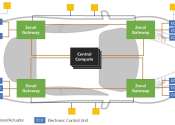Robots track moving objects using RFID tags to home in on targets
A novel system developed at MIT uses RFID tags to help robots home in on moving objects with unprecedented speed and accuracy. The system could enable greater collaboration and precision by robots working on packaging and ...
Feb 19, 2019
0
24









